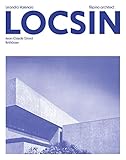Leandro Valencia Locsin : Filipino architect / Jean-Claude Girard.
Material type: TextPublisher: Basel : Birkhäuser, [2021]Copyright date: ©2022Description: 1 online resource (320 p.)Content type:
TextPublisher: Basel : Birkhäuser, [2021]Copyright date: ©2022Description: 1 online resource (320 p.)Content type: - 9783035620924
- 9783035620931
- 720.92 23
- NA1529.L63 G57 2022
- online - DeGruyter
- Issued also in print.
| Item type | Current library | Call number | URL | Status | Notes | Barcode | |
|---|---|---|---|---|---|---|---|
 eBook
eBook
|
Biblioteca "Angelicum" Pont. Univ. S.Tommaso d'Aquino Nuvola online | online - DeGruyter (Browse shelf(Opens below)) | Online access | Not for loan (Accesso limitato) | Accesso per gli utenti autorizzati / Access for authorized users | (dgr)9783035620931 |
Browsing Biblioteca "Angelicum" Pont. Univ. S.Tommaso d'Aquino shelves, Shelving location: Nuvola online Close shelf browser (Hides shelf browser)
Frontmatter -- Table of Contents -- Preface -- Preamble -- General Framework -- Renaissance Man -- Monumentality Redesigned -- International Influences: The Learning Period -- Development of a Language -- Facades in Motion -- Ground Changes -- Vernacular Building -- Back to the Beginning -- An Overture to the World -- Epilogue -- Bibliography -- Architectural Works -- Timeline of Works -- About the Author -- Acknowledgments
restricted access online access with authorization star
http://purl.org/coar/access_right/c_16ec
Das weitgehend unbekannt Werk des philippinischen Architekten Leandro V. Locsin (1928-1994). verkörpert die Suche nach Identität in der gebauten Darstellung. Nach dem Studium eröffnete Locsin 1953 sein Büro in der Hauptstadt Manila, die nach den Luftangriffen der Alliierten zur Befreiung der Philippinen von der japanischen Besatzung nahezu völlig zerstört war. Der Wiederaufbau, einhergehend mit technischen Innovationen sowie günstigen politischen und wirtschaftlichen Bedingungen, ermöglichten es ihm dann, eine große Bandbreite und eine Vielzahl von Projekten zu entwerfen, darunter Hotels, Geschäftsbauten, Kirchen, Kultureinrichtungen und öffentlichen Gebäuden. Sein Werk verbindet die Impulse der Moderne mit lokalen Traditionen und umfasst insgesamt 245 Projekte, von denen er mehr als die Hälfte realisieren konnte. Das Buch präsentiert eine Auswahl der wichtigsten Bauten und Projekte.
The largely unknown oeuvre of the Philippine architect Leandro V. Locsin (1928-1994) embodies the search for identity in the built environment. Having completed his studies, Locsin opened his practice in 1953 in the capital Manila which, after the aerial attacks by the Allied forces for the liberation of the Philippines from Japanese occupation, had been almost completely destroyed. The reconstruction, as well as technical innovations and favorable political and economic conditions, made it possible for him to design a wide range and large number of projects, including hotels, commercial buildings, churches, cultural venues, and public buildings. His work combines inspiration from modernism with local traditions and comprises a total of 245 projects, of which more than half were completed. The book presents a selection of the most important buildings and projects.
Issued also in print.
Mode of access: Internet via World Wide Web.
In English.
Description based on online resource; title from PDF title page (publisher's Web site, viewed 02. Mai 2023)









